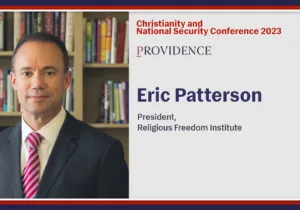Christianity’s political theology tips its hand at Christmastide. What’s in the cards for world order? Tidings of a coming “Desire of the Nations.” Songs of how “He rules the world with truth and grace, and makes the nations prove the glories of his righteousness and wonders of his love.” Promises of “peace on earth.” Juxtapose all this with our time, when trumpeting “America first” sounds to some like jingoist nationalism and to others like the return of national sovereignty. Christmastide evidently has something to teach about the nations, and by extension the nation-state and maybe America. But what exactly?
Christians judge something historical and relative when they reflect on the nation-state, a political form of the character rather than nature of government. Historical, because the nation-state conquered the earth only in the last century, and both the nations and government preceded it. Relative, because nation-states live in degrees of success or failure due to the cohesion of their underlying “nation.” This isn’t to say that the character of government is indifferent to moral judgment. Aristotle and Thucydides both saw in forms of political community certain tyrannies, collective recklessness, and individual vice, and Alexander Hamilton in Federalist No. 6 denied that democratic republics are less prone to wars of cupidity. Nonetheless, this is to say that the nation-state is something about which Christians may hold opinions of studied ambivalence.
How the nations united under their present states are stories riddled with injustice, coercion, and war. As Augustine says in The City of God, “If men were always peaceful and just, human affairs would be happier and all kingdoms would be small, rejoicing in concord with their neighbors. There would be as many kingdoms among the nations of the world as there are now houses of the citizens of a city.”[1] Ancient Israel arguably manifested a nation-state prototype, but its experiment to be an example to the nations as one of Augustine’s “small kingdoms,” content in its borders, was fleeting against forms of more aggressive empire.
And yet, we can discern something providential in the stability of life—that is, the peace—that successful nation-states provide, whatever their origin story. Augustine recognized that God lavished earthly benefits on the good and bad alike, even in the cruel and decadent Pax Romana, “and among these blessings is also to be reckoned the possession of an empire, whose extent He regulates according to the requirements of His providential government.”[2] Being born into a nation-state where order and liberty are in tolerable balance, such as America, is an inheritance to be grateful for.
Gratitude for a providential inheritance of peace suggests that a regime’s political action is more morally significant than its political form. We moderns tend first to question the legitimacy of a regime’s form (is it democratic?) before its actions, but Christmastide relativizes this priority. The universal prophecies about the nations coming to peace at the advent of our Lord implies that what the nations worship matters more than what form the nations take. So, a better first question may be whether a government is manifesting in political action the just end of its nature this side of Christmas.
So, what is political action in this morally significant sense? Politics is the uniting of wills into common moral purpose. For the biblical tradition shared by Jews and Christians, the prophetic office of the Hebrews rings down the centuries as a sounding bell of moral clarity because it held up as a mirror to its political action the covenant purpose of Israel, which was to manifest the peace of God with man. Although the wider community of nations has no similar divine covenant, the tidings of Christmas suggest there is now a common moral purpose for the nations: a certain kind of peace on earth, the tranquilitas ordinis. This is the tranquility of order in a just peace.
The tranquilitas ordinis is an earthly peace among man and nations, a concord in goodwill or satisfaction in agreement that transcends domestic peace and can be the aim of the temporal powers in their international relations. This is a peace adjusted to earthly goods that is necessary for the flourishing of mankind’s temporal life and connected to but insufficient for mankind’s eternal life. As Augustine says, “the whole use, then, of things temporal has a reference to this result of earthly peace in the earthly community, while in the city of God it is connected with eternal peace.”[3] In other words, it is within the peace among nations that the church is most free to flourish.
Therefore, nations manifesting the tranquilitas ordinis are serving the newborn king by preparing his rule. The church of God, the heavenly city, ingathering from the nations and sojourning among the earthly cities of the world, finds blessing and haven in the tranquilitas ordinis. As Augustine notes, “Even the heavenly city, therefore, while in its state of pilgrimage, avails itself of the peace on earth, and, so far as it can without injuring faith and godliness, desires and maintains a common agreement among men regarding the acquisition of the necessaries of life.”[4] So, the tranquility of order in a just peace is like clearing a way in the wilderness for the Lord, making straight a highway in the desert for the coming king.[5]
Finally, what does this imply for America? Simply this: As a matter of historical judgment, America has on balance manifest the tranquilitas ordinis, although it is not alone in doing so. The US constitutional order embodies some, but not all, vital truths of mankind this side of Christmas. For example, by recognizing the need for peacemaking through law at multiple scales of society and fostering it in a federal structure. This insight into the ways of domestic peace propelled Americans to build international institutions to foster peace among nations. While Americans built in the Cold War a “rules-based liberal order” out of strategic necessity, America’s rhetoric about it manifests an aspiration beyond strict national interest. There is a hope for the tranquilitas ordinis, a temporal peace among nations, embedded in America’s grandest international achievements of the twentieth century.
—
Nathan Hitchen is a graduate of the Johns Hopkins School of Advanced International Studies and an alumnus of the John Jay Institute.
Photo Credit: US service members assigned to Combined Joint Task Force – Horn of Africa, alongside service members from partner nations, taking part in a Christmas Eve service in Mogadishu, Somalia, on Dec. 24, 2017. US Air Force photo by Staff Sgt. Timothy Moore.
[1] City of God, IV, 15.
[2] City of God, V, 26.
[3] City of God, XIX, 17
[4] City of God, XIX, 17
[5] Isaiah 40:3.






